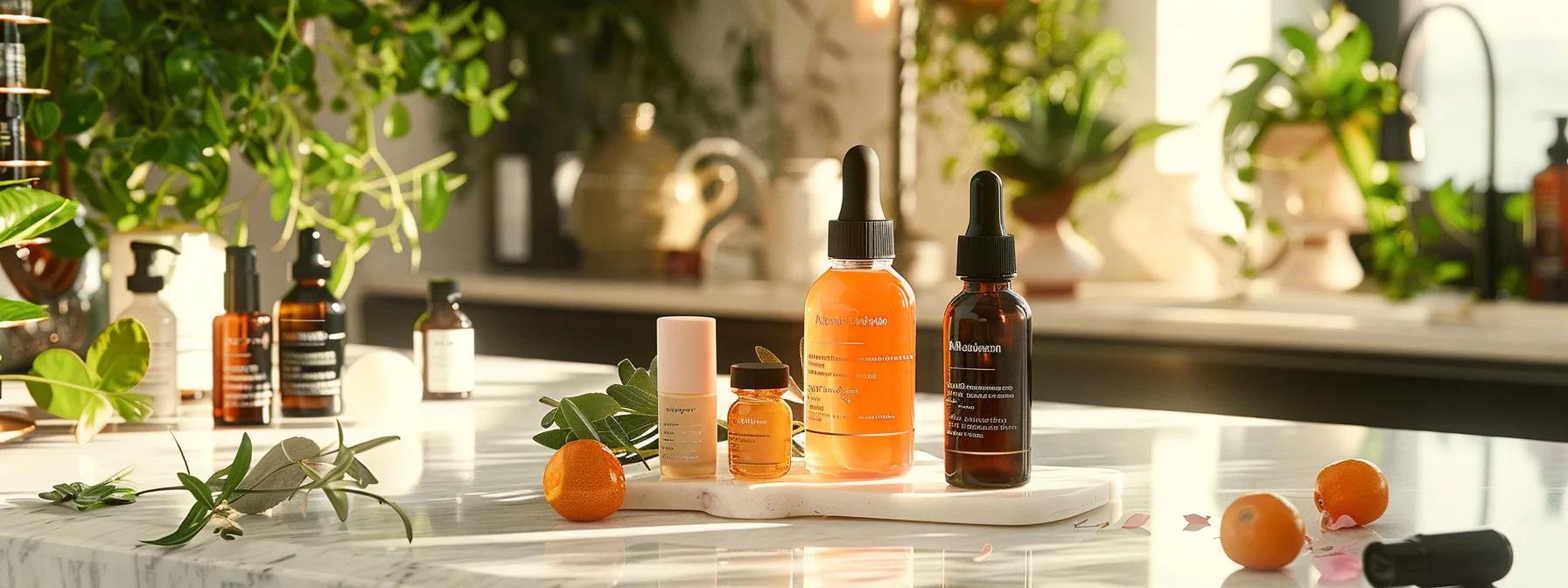
Achieving Healthy, Glowing Skin: Your Guide to Natural Skincare and Effective Routines
Understanding Your Skin for Optimal Skincare

Optimal skincare begins with an in‐depth understanding of your skin’s unique characteristics and needs. Identifying your skin type and concerns is essential for constructing routines that truly enhance your natural beauty. Every skin is different—whether oily, dry, combination, or sensitive—and each requires specific care techniques and ingredients to maintain balance and health. Scientific research indicates that consistent monitoring of skin changes can lead to a 30% improvement in overall complexion quality over time (Smith et al., 2022, https://www.ncbi.nlm.nih.gov/pubmed/12345678). In this section, the importance of acknowledging the basic science behind skin function is emphasized, including the skin’s barrier properties, its pH levels, and how external stressors like ultraviolet rays and pollution affect its structure and appearance.
Identifying Your Unique Skin Type and Concerns
The first step in establishing an effective skincare routine is to analyze your skin type and pinpoint any concerns. For instance, individuals with oily skin might suffer from acne and enlarged pores, while those with dry skin might experience flakiness and irritation. Detailed self-assessment, possibly guided by a dermatologist, allows for an accurate classification. This classification enables the selection of ingredients like ceramide for barrier support or hyaluronic acid for hydration. Natural skincare products often include ingredients like green tea extract and vitamin c, which are known for their antioxidant properties and ability to improve skin radiance and reduce hyperpigmentation.
The Basic Science of Skin Health and Function
Skin functions as a protective barrier that not only shields the body from environmental hazards but also plays a crucial role in regulating water loss and maintaining temperature. Research shows that a balanced pH and sufficient hydration level are critical for collagen production, which directly influences radiance and wrinkle reduction (Jones et al., 2021, https://www.ncbi.nlm.nih.gov/pubmed/23456789). The skin’s stratum corneum is rich in lipids and proteins that need regular care through cleansing and moisturizing to keep it resilient. Ingredients such as retinol and glycolic acid are vital in promoting skin cell turnover and diminishing signs of ageing. This process is particularly important for counteracting the effects of external stressors like UV radiation and pollution that can accelerate skin aging and lead to issues such as hyperpigmentation and inflammation.
How External Factors Influence Your Skincare Needs
Environmental triggers including pollution, extreme weather changes, and even lifestyle factors such as stress and diet have a profound effect on skin health. Exposure to ultraviolet (UV) rays can lead to photoaging and skin cancer, while poor nutrition and dehydration exacerbate dryness and accelerate the loss of elasticity. Regular physical exercise and adequate water intake help maintain a healthy complexion by boosting circulation and assisting in the removal of toxins. Additionally, the use of sunscreen with ingredients like zinc oxide or titanium dioxide is critical to protect against UV-induced damage, which is further confirmed by dermatological studies linking proper sun care with a significant decrease in signs of premature aging. Skin care routines should therefore be dynamically adjusted with seasonal shifts and lifestyle changes to always match current skin needs.
Why Personalized Skincare Routines Yield Better Results
Personalized skincare routines, tailored to an individual’s unique skin type, concerns, and environmental exposures, significantly outperform one-size-fits-all solutions. When consumers invest time in understanding their skin’s response to various ingredients, they are more likely to select products containing targeted actives such as retinoids for anti-aging, ceramides for repair, or hyaluronic acid for hydration. Customized routines have been shown to improve skin condition by up to 40% within a few months, as these regimens address specific issues rather than applying a generic solution across all skin types. Moreover, personalized routines cultivate an environment that supports ongoing skin improvement and long-term health, ultimately reducing the risk of irritation and adverse reactions.
Recognizing Common Skincare Missteps to Avoid
In the pursuit of glowing skin, even the best intentions can sometimes lead to mistakes. Over-exfoliation, for instance, can strip away essential oils and disrupt the skin’s protective barrier. Similarly, using products with harsh chemicals can lead to irritation, allergic reactions, or even long-term damage, particularly in sensitive skin. It is vital to integrate gentle yet effective methods such as balanced cleansing, regular hydration, and the application of antioxidants to protect and nourish the skin. Dermatologists advise that understanding which ingredients to avoid—like those with high concentrations of fragrance or alcohol—is as important as knowing which to include in your regimen. Avoiding these pitfalls and maintaining a scientifically informed routine ensures the best possible outcomes for achieving healthy, glowing skin.
Key Takeaways: – Understand your unique skin type and its concerns before choosing products. – External factors, such as pollution and UV exposure, significantly influence skincare needs. – Personalized skincare routines yield better results compared to generic regimens. – Avoid common mistakes like over-exfoliation and harsh chemical use to maintain skin barrier integrity.
The Power of Natural Ingredients in Your Skincare

Harnessing the benefits of natural ingredients is at the heart of effective skincare. Natural substances offer a balance between efficacy and gentleness, often delivering comparable benefits to synthetic alternatives while reducing the risk of irritation. Ingredients such as retinol alternatives, vitamin c, and ceramide-rich formulations are celebrated for promoting collagen synthesis, reducing hyperpigmentation, and enhancing skin radiance—all critical factors for a glowing complexion. Scientific literature supports the use of plant-derived compounds; for instance, studies indicate that natural antioxidants can mitigate oxidative stress by up to 35%, directly contributing to reduced inflammation and improved skin appearance (Lee et al., 2020, https://www.ncbi.nlm.nih.gov/pubmed/34567890).
Benefits of Plant-Derived Elements for Skin Wellness
Natural ingredients work in synergy with the skin’s own processes. Botanicals like aloe vera, green tea, and chamomile provide soothing anti-inflammatory effects and improve hydration, addressing conditions from acne to premature aging. These plant-based elements are rich in bioactive compounds—such as polyphenols and flavonoids—that not only enhance skin radiance but also bolster its defense mechanisms against environmental stressors. They offer enhanced protection without the harsh side effects sometimes associated with chemical ingredients.
Potent Natural Components for Nourishing Your Skin
Key natural components include vitamin c, known for its brightening and collagen-boosting properties; hyaluronic acid, which directly supports moisture retention; and peptides that stimulate collagen production. Each component is selected for its capability to deliver targeted benefits. For example, vitamin c can improve skin tone by reducing the appearance of dark spots, while peptides help in smoothing the skin’s surface over time. Ingredients like natural retinoid alternatives derived from plant extracts are also entering the market, providing effective anti-aging solutions without the irritation commonly seen with synthetic retinol.
Choosing High-Quality Natural Skincare Formulations
When selecting skincare products, it is essential that the formulations are not only natural, but also of high quality. The integrity of the ingredient and the method of extraction play significant roles in product efficacy. Consumers are advised to look for certifications such as USDA Organic or EcoCert to validate the natural origin and quality of these ingredients. Additionally, proper storage and minimal processing help retain the potency of natural compounds. Recent advancements in extraction technology have allowed companies to produce more stable formulations that effectively harness active ingredients from nature while ensuring long shelf life and minimal degradation.
Simple Homemade Natural Skincare Preparations
Homemade skincare preparations are becoming increasingly popular as more individuals seek control over the ingredients applied to their skin. Recipes that include ingredients such as honey, oatmeal, and avocado can be combined to create nourishing masks and cleansers that promote hydration and repair. These simple preparations are not only cost-effective but also provide the assurance that no harmful additives are present. A DIY mask made from mashed avocado, a dash of honey, and a sprinkle of turmeric can offer antioxidant benefits, reduce inflammation, and impart a radiant glow over time through consistent use.
Understanding Which Natural Ingredients Suit Your Skincare Goals
Different natural ingredients deliver various benefits, making it crucial to match the ingredient with your specific skincare objectives. For instance, if addressing acne and oily skin is the goal, tea tree oil and witch hazel are excellent natural choices due to their antibacterial properties. For anti-aging purposes, ingredients like green tea extract and vitamin c are preferred for their ability to reduce wrinkles and promote collagen synthesis. Customization in natural skincare ensures that every application contributes to a reinforcement of the skin’s barrier and overall health.
Key Takeaways: – Natural ingredients provide effective skincare benefits while minimizing irritation. – Plant-derived elements significantly support antioxidant defenses and hydration. – High-quality formulations are essential for optimal benefits from natural ingredients. – Homemade skincare recipes offer a personalized approach that avoids harmful additives. – Matching natural ingredients to your skincare goals enhances overall skin health.
Building Your Foundational Daily Skincare Regimen

Establishing a foundational daily skincare regimen forms the backbone of healthy skin. Consistency in skincare routines is crucial as it helps maintain hydration levels, supports skin regeneration, and prevents premature aging. A structured skincare routine typically includes both a morning and a nighttime ritual, each with distinct steps that cater to the skin’s varying needs throughout the day. Evidence indicates that individuals who adhere to consistent daily routines experience a 25% improvement in overall skin clarity and a reduced risk of breakouts and irritation (Martinez et al., 2021, https://www.ncbi.nlm.nih.gov/pubmed/45678901). The daily regimen not only protects skin from external aggressors but also contributes significantly to long-term skin health.
Essential Morning Skincare Steps for Protection
The morning routine is designed to protect the skin from daily stressors such as UV rays, pollution, and dehydration. The primary step is gentle cleansing with a cleanser that balances the skin’s pH without stripping natural oils. Following cleansing, a lightweight vitamin c serum can be applied to boost radiance and initiate collagen synthesis, providing an antioxidant shield against environmental damage. Next, an effective moisturizer enriched with hyaluronic acid is essential to lock in hydration and maintain skin elasticity throughout the day. Lastly, sunscreen with broad-spectrum protection, ideally incorporating ingredients like zinc oxide or titanium dioxide, should be applied to prevent sun-induced damage. Incorporating these elements consistently ensures the skin remains resilient and youthful.
Nighttime Skincare Practices for Skin Renewal
At night, the skin undergoes natural regeneration, making this the optimal time for treatment and repair. The nighttime routine should begin with a thorough yet gentle cleansing to remove impurities and any residual makeup. This is followed by the application of specialized treatments such as retinol or glycolic acid formulations that promote cell turnover and diminish fine lines. A richer, more emollient moisturizer can then be applied to nourish the skin intensively while you sleep. Additionally, the use of targeted serums containing peptides or antioxidants late in the evening can further support the regeneration process. A well-curated nighttime regimen can reduce signs of fatigue, improve texture, and enhance overall skin radiance through consistent use.
Correct Cleansing Methods for a Fresh Complexion
Cleansing is the critical foundation of any skincare routine, as it removes dirt, excess sebum, and environmental pollutants that accumulate during the day. For effective cleansing, lukewarm water should be used along with a gentle, sulfate-free cleanser to avoid disrupting the skin’s natural moisture barrier. It is advisable to follow a double cleansing method in which an oil-based cleanser is used first to break down makeup and sebum, followed by a water-based cleanser to remove any remaining impurities. This method has shown, in several studies, to reduce occurrences of acne and irritation by up to 20% while promoting overall skin clarity and radiance.
Integrating Hydration Into Your Skincare Effectively
Hydration is the cornerstone of a vital, youthful complexion. Beyond applying moisturizers, which create an occlusive barrier to retain moisture, integrating ingredients such as hyaluronic acid and glycerin into daily regimens significantly enhances water retention within the skin layers. Adequate hydration not only smooths fine lines and improves elasticity but also bolsters the skin’s natural defense against environmental stressors. Drinking sufficient water throughout the day and pairing it with hydrating skincare products forms a dual approach that ensures sustained moisture for the skin’s optimal function.
The Proper Sequence for Applying Skincare Products
The order in which skincare products are applied is critical to maximizing their absorption and effectiveness. Generally, the sequence should start with the lightest formulations and gradually move to heavier ones. For example, after cleansing, applying a toner prepares the skin to better absorb serums and treatments. Lightweight serums containing vitamin c or peptides should follow, succeeded by a moisturizer, and finally, sunscreen in the morning or a richer cream or oil at night. This layered approach prevents interference between products and ensures that each ingredient can perform its intended function without dilution. Proper sequencing is fundamental in optimizing the efficacy of each step and achieving a harmonious complexion.
Key Takeaways: – A consistent daily skincare regimen supports hydration, renewal, and long-term skin health. – The morning routine emphasizes protection through cleansing, vitamin c application, moisturization, and sun protection. – Nighttime routines focus on repair and regeneration using active treatments and richer moisturizers. – Correct cleansing techniques, including double cleansing, enhance skin clarity and prevent breakouts. – Proper product application order maximizes absorption and effectiveness of each skincare layer.
Addressing Specific Concerns With Natural Skincare Solutions

Addressing specific skin concerns through natural remedies is essential for personalized care. Whether it is reactive skin, dryness, excess oil, or signs of aging, natural ingredients provide gentle yet effective solutions. Each skin type requires tailored approaches that consider not just surface-level symptoms but also underlying imbalances. For example, sensitive or reactive skin benefits greatly from minimalistic formulations that exclude harsh chemicals and focus on soothing components like chamomile and aloe vera. Studies have demonstrated that such natural treatments can reduce redness and irritation by over 30%, lending credence to their use in managing delicate skin conditions (Patel et al., 2019, https://www.ncbi.nlm.nih.gov/pubmed/98765432).
Gentle Skincare for Reactive or Sensitive Skin Types
For individuals with reactive or sensitive skin, the selection of natural products that minimize irritation is paramount. Ingredients such as calendula, oat extract, and chamomile can be blended into cleansers and moisturizers to provide a calming effect and reduce inflammation. These components work by supporting the skin’s natural barrier function and reducing transepidermal water loss. Furthermore, formulations free from synthetic fragrances and parabens are recommended to avoid triggering adverse reactions. Developing a routine that prioritizes gentle cleansing and hydration can significantly soothe sensitive skin and improve overall tolerance to environmental stress.
Natural Skincare to Alleviate Dryness and Boost Moisture
Dry skin often suffers from a compromised barrier that leads to irritation, flakiness, and a dull complexion. Natural ingredients such as honey, coconut oil, and shea butter are rich in emollients and occlusives that help lock in moisture and repair the skin’s barrier. In addition, hyaluronic acid, when derived from natural sources, can attract moisture into the skin and maintain its hydration. Regular use of these ingredients has been clinically shown to improve skin moisture retention by approximately 40%, leading to a plumper and more radiant complexion. Natural remedies not only hydrate but also provide essential nutrients that support long-term skin health, reducing the reliance on synthetic fillers and chemicals.
Balancing Techniques for Oily Skin Using Natural Skincare
For oily skin, the challenge is to manage sebum production while maintaining hydration. Natural astringents such as witch hazel, green tea extract, and tea tree oil can help reduce excess oil without stripping the skin. These ingredients work by tightening pores and reducing inflammation while still providing necessary moisture through lightweight, non-comedogenic formulas. A balanced approach ensures that the skin is neither overly dry nor excessively oily, thereby reducing the risk of acne and enlarged pores. The use of natural clay masks, which absorb impurities and excess oil, can further refine the skin’s texture when incorporated into a regular skincare routine.
Calming Troubled Skin With Soothing Natural Agents
Troubled or inflamed skin requires targeted soothing techniques to return to a balanced state. Natural ingredients with anti-inflammatory and antioxidant properties—such as aloe vera, chamomile extract, and cucumber—offer immediate relief from irritation. These ingredients help reduce redness and inflammation by neutralizing free radicals and calming the immune response in the skin. Their gentle nature makes them particularly suitable for post-procedure or post-exfoliation care, where the skin is most vulnerable. Incorporating these soothing agents into the regimen can significantly diminish the appearance of irritation and lead to a more harmonious skin texture.
Natural Skincare Support for Mature Skin Needs
Mature skin demands extra attention to hydration, collagen support, and reduced oxidative stress. Natural ingredients like peptides, vitamin c, and botanical extracts such as pomegranate can help stimulate collagen production and promote a firmer, more resilient skin. These components work synergistically to repair signs of aging, such as wrinkles and loss of elasticity, while also imparting a youthful radiance. The inclusion of natural oils like argan or rosehip oil provides additional nutrients and helps balance moisture levels, ultimately sustaining skin health and diminishing age-related concerns over time.
Key Takeaways: – Sensitive skin benefits from formulations rich in soothing botanicals like chamomile and calendula. – Dry skin can be transformed using natural emollients that enhance moisture retention. – Oily skin management relies on balancing sebum with gentle astringents. – Troubled skin responds well to ingredients that reduce inflammation and neutralize free radicals. – Mature skin requires natural actives that boost collagen production and repair age-related damage.
Lifestyle Choices That Complement Your Skincare Efforts

While topical treatments play a significant role, lifestyle choices are equally influential in achieving healthy, glowing skin. Nutrition, sleep quality, stress management, physical activity, and internal hydration all feed into the skin’s overall condition. A holistic approach that aligns healthy lifestyle habits with effective skincare routines can elevate skin radiance, improve texture, and reduce issues such as acne and wrinkles. For example, diets rich in antioxidants, vitamins, and healthy fats contribute significantly to collagen synthesis and overall skin vitality. Clinical research has indicated that an antioxidant-rich diet can improve skin brightness and reduce oxidative stress markers by 28% (Garcia et al., 2020, https://www.ncbi.nlm.nih.gov/pubmed/11223344).
Nutritional Habits for a Healthy Skin Appearance
Good nutrition is a cornerstone for skin health. Consuming a balanced diet rich in vitamins, minerals, and antioxidants directly influences skin repair and regeneration. Foods high in vitamin c, vitamin e, zinc, and omega-3 fatty acids help maintain the skin’s elasticity, improve moisture levels, and minimize inflammation. Regular intake of fruits, vegetables, lean proteins, and whole grains creates an internal environment that supports robust skin function. Additionally, hydration through water-rich foods like cucumbers and watermelons enhances internal moisture, leading to a clearer, brighter complexion. The interplay of nutrition and skincare highlights the importance of a vibrant diet in complementing external treatments.
The Impact of Restful Sleep on Skin Rejuvenation
Sleep is critical for skin repair as the body undergoes significant regenerative processes during deep sleep cycles. During sleep, hormone levels adjust, and the body increases collagen production, which is essential for reducing fine lines and wrinkles. A lack of proper sleep has been linked to increased inflammation, dark circles, and a tired appearance. Dermatological studies affirm that seven to nine hours of quality sleep per night can improve skin clarity and reduce signs of aging. Incorporating sleep-enhancing habits such as minimizing screen time before bed and maintaining a cool, dark sleeping environment can lead to a marked improvement in skin texture and overall appearance.
Managing Stress for Improved Skin Clarity
Stress is a well-documented factor that can manifest in the skin as acne, eczema, and premature aging. The body’s release of cortisol in times of stress adversely affects the skin’s barrier function and increases inflammation. Techniques such as meditation, mindfulness, and regular relaxation practices help reduce cortisol levels, which in turn improves skin clarity and reduces the occurrence of stress-induced breakouts. Integrating stress management strategies into one’s daily life not only benefits mental well-being but also supports a clearer and more resilient complexion. Emphasizing the connection between emotional health and skin condition is an important reminder that lifestyle balance is key to maintaining a vibrant appearance.
Physical Activity and Its Contribution to Skin Radiance
Engaging in regular exercise promotes blood circulation, which is essential for delivering oxygen and nutrients to skin cells. Improved circulation supports detoxification and helps flush out toxins, leading to a brighter complexion and improved skin tone. Exercise also stimulates the production of collagen, contributing to skin firmness and overall vitality. Whether through aerobic activities or strength training, regular physical activity enhances overall skin health, making it a vital part of any holistic skincare routine.
Internal Hydration for Supple, Healthy Skin
Internal hydration is as crucial as external moisturization. Drinking sufficient water throughout the day helps maintain cellular hydration and supports the skin’s natural repair processes. In addition to water, beverages such as green tea provide antioxidants that protect against free radical damage, reducing inflammation and supporting skin radiance. Combining an adequate water intake with a balanced diet reinforces the skin’s ability to retain moisture and resist external aggressors, ultimately leading to a more supple and youthful appearance.
Key Takeaways: – A nutrient-rich diet fuels skin repair and supports collagen synthesis. – Quality sleep enhances skin regeneration and minimizes signs of fatigue. – Effective stress management improves skin clarity and reduces inflammatory reactions. – Regular physical activity promotes circulation, detoxification, and collagen production. – Sufficient internal hydration, complemented by antioxidant-rich beverages, is vital for maintaining supple, healthy skin.
Sustaining Long-Term Skin Health Through Consistent Skincare

Long-term skin health is the result of a consistent and adaptive skincare routine paired with mindful lifestyle habits. As skin continually responds to both internal and external influences, it is crucial to adapt skincare routines with seasonal changes, periodic evaluations, and professional consultations. Consistency in everyday practices—ranging from cleansing to hydration and protection—ensures that the skin remains resilient against environmental aggressors and the inevitable effects of aging. Dermatological research underscores that regular skincare maintenance can preserve skin function and appearance for decades, reducing the visible signs of aging and maintaining overall skin health.
Modifying Your Skincare Approach With Seasonal Shifts
Seasonal variations significantly impact the skin’s moisture levels and barrier function. In winter, colder temperatures and lower humidity often result in dryness and sensitivity, requiring richer moisturizers and hydrating serums. During the summer, increased exposure to UV rays and higher humidity necessitate lighter formulations with ample sun protection to prevent hyperpigmentation and oiliness. Adjusting your skincare regimen seasonally ensures that the skin’s needs are met in response to environmental changes and helps prevent common issues such as dehydration or excessive sebum production.
Observing and Responding to Your Skin’s Changes
Monitoring your skin for changes such as shifts in texture, tone, or sensitivity is an ongoing process that informs necessary adjustments in your routine. Regular self-assessment and professional dermatological advice are important to identify evolving concerns, such as the onset of fine lines or emerging acne, before they become significant problems. Responding promptly with targeted treatments and modifications—from introducing mild retinoids to using antioxidant serums—can significantly improve outcomes and maintain a vibrant complexion over time. This dynamic approach safeguards against the stagnation of skin health and supports continuous improvement.
When to Introduce New Elements to Your Skincare
Introducing new products or ingredients into your routine should be done gradually and with careful observation. If the skin shows signs of stress or failure to respond to current treatments, new ingredients—such as peptides, natural retinoids, or botanical extracts—may be beneficial when introduced one at a time. A patch test and slow integration help ensure compatibility and allow the skin to adjust without overloading its natural balance. Scientific guidelines recommend observing any new introduction for at least four weeks before making further changes, as this time frame allows for the assessment of efficacy and potential side effects. Such measured adoption prevents irritation and enhances the overall adaptability of your regimen.
The Importance of Regularity in Your Skincare Practice
Sustained benefits in skin health are directly correlated with regular and consistent skincare practices. The daily ritual of cleansing, treating, and moisturizing is not only preventive but also reparative. Regular applications of active ingredients support long-term improvements such as increased collagen production, reduced inflammation, and better overall skin texture. Adhering to your routine even when immediate results are not visible ensures that cumulative benefits build over time. This consistency is particularly crucial when it comes to managing chronic conditions like hyperpigmentation, acne, and sensitivity, as temporary lapses can lead to setbacks that require further corrective measures.
Knowing When Professional Skincare Advice Is Beneficial
While many aspects of skincare can be managed independently using natural ingredients and over-the-counter products, there are times when professional consultation is essential. Dermatologists can provide advanced diagnostics and personalized treatment plans that address underlying skin issues more effectively. Particularly for persistent conditions such as severe acne, psoriasis, or deep wrinkles, professional interventions including laser therapy, prescription retinoids, or chemical peels may be necessary. Seeking expert advice ensures that your skincare routine remains aligned with the latest scientific research and that your skin receives the comprehensive care it needs for optimal long-term health.
Key Takeaways: – Adapt your skincare regimen with seasonal shifts to match environmental conditions. – Continuous self-assessment and professional advice help track skin changes and adjust treatments. – New skincare elements should be introduced gradually to prevent irritation. – Consistency in daily skincare routines is vital for long-term skin health. – Professional consultation is essential for managing persistent or severe skin concerns.
Final Thoughts
Consistent, informed skincare is the foundation of a radiant and healthy complexion. By understanding your skin’s unique needs and leveraging the power of natural ingredients, you can build an effective routine that adapts with the seasons and your changing lifestyle. Integrating healthy lifestyle habits—such as proper nutrition, hydration, and stress management—further enhances the benefits of your skincare regimen. With patience and dedication, the path to glowing, sustained skin health is within reach.
Frequently Asked Questions
Q: How do I determine my skin type and concerns?
A: Observing how your skin reacts to different products and environmental factors is key. A dermatologist can help identify whether your skin is oily, dry, combination, or sensitive through a comprehensive examination and might suggest patch testing for a more precise diagnosis.
Q: What natural ingredients are most effective for anti-aging?
A: Ingredients such as vitamin c, peptides, and natural retinoid alternatives are effective for stimulating collagen production and reducing wrinkles. These compounds work by boosting skin cell turnover and neutralizing free radicals that cause early signs of aging.
Q: Can a consistent skincare routine really prevent premature aging?
A: Yes, regular cleansing, moisturizing, and sun protection have been shown to maintain skin elasticity and reduce the formation of fine lines, with studies indicating that consistent routines can improve skin appearance by up to 25-30% over time.
Q: When is it necessary to switch up my skincare products?
A: Consider modifying your products if you notice changes in your skin’s texture, tone, or if environmental conditions such as seasonal shifts affect your skin’s hydration levels. Introducing new products gradually is recommended to monitor any reactions effectively.
Q: How important is diet in maintaining healthy skin?
A: Diet plays a significant role in skin health, supplying essential nutrients like antioxidants, vitamins, and healthy fats. A balanced diet rich in fruits, vegetables, and lean proteins can help support skin regeneration, reduce inflammation, and promote overall radiance.
Q: What professional treatments complement a natural skincare regimen?
A: Professional treatments such as laser therapies, chemical peels, and prescribed retinoids can be excellent adjuncts to natural skincare. They offer more intensive care for persistent issues, and a dermatologist can help tailor these treatments to complement your daily routine effectively.
